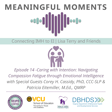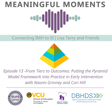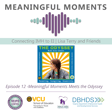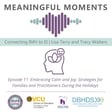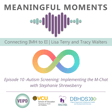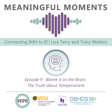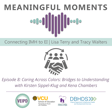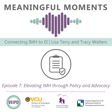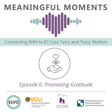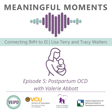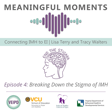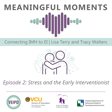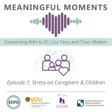Become a Creator today!Start creating today - Share your story with the world!
Start for free
00:00:00
00:00:01

We ALL Have a Role in Infant Mental Health (IMH)
In this episode, Lisa and Tracy discuss the skills and strategies from Weatherston’s (2000) article, The Infant Mental Health Specialist.
Visit https://veipd.org/main/index.html or https://www.vaimh.org/ for more information.
Additional Resources discussed:
CDC Milestones: https://www.cdc.gov/ncbddd/actearly/milestones/index.html
Brain Power of Natural Learning Opportunities (page 2): https://www.veipd.org/main/pdf/coaching_and_telehealth_families_9.11.20.pdf
Ghosts in the Nursery Video Explanation: https://youtu.be/e7HxuTZ7A_E
References:
Weatherston, D. The Infant Mental Health Specialist. Zero to Three: National Center for Infants, Toddlers and Families, Oct./Nov. 2000. October 2000.
Transcript
Introduction and Host Introductions
00:00:10
Speaker
Welcome, everyone, to Meaningful Moments Connecting Infant Mental Health to Early Intervention. My name is Lisa Terry. I am an early intervention professional development consultant at Virginia Commonwealth University with the Partnership for People with Disabilities. I am also endorsed as an infant family specialist. I'm also a zero to three growing brain trainer.
00:00:34
Speaker
And I also co-facilitate the Division of Early Childhood's Infant Mental Health Community of Practice. I'm going to go ahead and let my co-host introduce herself. Tracy, go ahead. Hey guys, it's so good to be with you again and to be with Lisa, my partner in crime here. My name is Tracy Walters. I'm the state coordinator for Infant and Early Childhood Mental Health.
00:00:56
Speaker
I'm also endorsed as an infant family specialist and I just kind of oversee all things infant and early childhood mental health for Virginia.
Sponsorship and Podcast Focus
00:01:05
Speaker
So lucky to get to work with so many of you guys in early intervention and an infant and early childhood mental health CSBs and all those great spaces that we're working with children and families.
00:01:16
Speaker
So we're just going to start by giving you our sponsor message. This podcast is a collaborative effort from the Virginia Department of Behavioral Health and Developmental Services through a contract with the Partnership for People with Disabilities at Virginia Commonwealth University.
00:01:31
Speaker
And let's talk about what we are going to focus on today. Our topic is we all have a role in infant mental health.
Emotional Well-being in Families
00:01:41
Speaker
So we're going to focus on the skills and strategies that anyone working with young children and families can do to really support the emotional well-being of all families.
00:01:51
Speaker
Specifically, we are actually going to be breaking down the strategies and the skills from Deborah Weatherson's article called The Infant Mental Health Specialist. So before we get to the skills and strategies, let's break down first, Tracy, the why. So why do you think it is really important for all practitioners to support the emotional well-being of all families?
00:02:14
Speaker
Yeah, Lisa, thanks for the opportunity to talk about that because I think it's really important that we start with the frame of mind that this is not just for infant mental health practitioners to be thinking about, but it's for all of us to be thinking about.
Social-Emotional Wellness and Learning
00:02:30
Speaker
So whether you're an early interventionist,
00:02:32
Speaker
If you're an early childhood special education, you're working in a preschool program, this is an important factor for all of us. Why it's important is this social emotional wellness that we're going to be speaking of and why we have a role in planning that. It's the foundation for all other learning.
00:02:53
Speaker
So if you were thinking about playing a game like Candyland or something where you have to get from A to B, right, if we don't start with those important pieces of like attachment,
00:03:04
Speaker
and relational health for young children and families. We're not going to get to those other things that you may be identifying as goals on those IFSPs and all those beautiful documents that we talked about in our last document that we have to get through in a day. It's really important that we're looking at that. It also validates for families that this is extremely important
00:03:28
Speaker
I think it's, uh, it reminds me of when people talk about soft skills, like even in our grown up professional lives, people may say, well, he has a lot of math skills and she has a lot of scientific skills or whatever the skills are. But you know, when people start talking about the soft skills for many years about like just how we are with other people, how we communicate, how we get into relationship,
00:03:51
Speaker
That was not really yielded as important for so many years. And now we're seeing how critical that is. And it's the same in this space, right? It's really the same. These skills really are the foundation for all other learning and health.
00:04:08
Speaker
Right. And the important thing to know too, I mean, because I feel like I hear all the time that I went to school to study, you know, gross motor development, that's really my background. That's what I know, or language, right? For SLPs or PTs or OTs, right? You have a specialized skill set, right? But what we have to understand is that social emotional development is going to impact
00:04:33
Speaker
every single domain. So it is going to impact cognitive, it's going to impact gross motor, it's going to impact those fine motor skills, it's going to impact your expressive and receptive language. And so we really need to make sure that we're understanding. So for example, let me give you an example. So a child that is just learning how to walk, for example, right? So they are just learning to walk. Sometimes
00:05:00
Speaker
kids need to build their confidence. You can see how that social-emotional is impacting that child because they're scared, right? They're scared they're gonna fall down. They're scared they're gonna get hurt. They're scared they're gonna fail. A lot of children tend to avoid tasks that they don't feel like they have the skills to do. And so we have to understand that piece so that we can really work on building that child's confidence first.
00:05:27
Speaker
So yes, Tracy, did you have something to add to that? I was just going to say,
Collaborative Approaches in Early Intervention
00:05:31
Speaker
I mean, I think that is really true. And that as as a professional team, right, that's why we have many disciplines on a team in early intervention, right? We don't need things to be with one single lens, we need a multi lens approach to working with children and families. Otherwise, we're really missing an opportunity. So when I'm sitting next to an SLP,
00:05:54
Speaker
You know, they're going to bring things into that observation and into building plans for that child and strategies for that child that I want to have the expertise to do. But one thing that we all can agree on, I think, and one thing that we can all note is how is this child showing up in the world? What are we seeing in their behaviors? How are they communicating with us? And when we're looking at behaviors in this context, really what I'm talking about is
00:06:22
Speaker
What messaging is coming from the child? You speak to that idea of the confidence, Lisa. This is so important. You know, one thing that always comes to mind for me is this term social referencing for children, right? So you see a mom at a park with a child, and that child might walk out a little bit to the playground equipment to explore, but then they quickly come back and lean on mommy, right? Just to say, am I safe? Is this okay? Am I doing this right? And then mom says,
00:06:50
Speaker
fine, you know, go ahead. You're interested in that slide or whatever it is. But that is also our rules as professionals. This is not the time to stay in your lane, so to speak. This is a time for us to be working collaboratively, collaboratively, I'm sorry, across the disciplines to say, hey, we're all putting attention here and focus here because it is that ground level of all of the remains we need to be pushing through.
00:07:20
Speaker
to support this child. So, absolutely, it's really critical that we're all using our best eye on that child and family. And each one of us, Lisa, has not only a specific skill set tied to our discipline of study, but also who we are as a human being and what experiences that we bring with us to the table. And I think it goes back to that our way of being, again, as professionals.
00:07:50
Speaker
And that is yours is just as important as mine. And it's important for us to hear each other on that level. Absolutely Tracy. And thank you for bringing up that point. And you're right. I mean, I have honestly been so blessed and I have learned from so many great providers over the years who have just mentored me and I have soaked in everything that they're saying. And it's really just helped make me a well-rounded provider too. And so I've just really appreciated
00:08:17
Speaker
just the perspectives that other people bring. And I think that's what you always need to bring with you, right? Is just this desire and, you know, yearning to continue to learn and grow from everybody because they all have something that they bring to the table, some knowledge, some experience that you can learn from. Yeah, and I think the other part of that too is we kind of mentioned in the last episode about
00:08:45
Speaker
Just kind of stay in the open and curious. That's one thing we always want to do as professionals. We really want to make sure that learning is a lifelong process for us as well. The moment that we start closing out other people's thoughts, opinions, and professional expertise or their human experience that they bring to these relationships in early intervention and infant mental health,
00:09:11
Speaker
is the moment that we are losing opportunity for that child and family. So I think there are some strategies that we can kind of use along the way. It's not that we're going to agree completely with everything that's being said, but I think what we can do is acknowledge what others are sharing and also use statements like, tell me more about that when someone shares an idea or thought that they have about something that they're seeing. And again, one of those
00:09:39
Speaker
really dig your teeth in statements and infinitely childhood mental health, which is that I'm wondering, I'm wondering, what do you think this mom is seeing when she sees this child do this and grabbing that information from all these multiple disciplines? I mean, do you
Strategies from Deborah Weatherson's Article
00:09:56
Speaker
think those kinds of things are effectively
00:09:58
Speaker
Absolutely Tracy and it's so funny because I will even say even though I've been in the field for many years, even people that are just coming into the field as new early interventionists, I learned so much from them too.
00:10:13
Speaker
because they have this new knowledge, right? From when I went to school of how they're looking at things and how they're, you know, problem solving and what they're observing and what they see and what they're sharing. And so I just think, you know, you have to just make sure that you are valuing everyone that it's really working in this field because they all bring something different.
00:10:36
Speaker
Let's now really get into those skills and strategies. So there are actually 10 that whether sin really describes in her article that are not unique to the infant mental health specialist. So what does that mean? That means that we all play a role
00:10:52
Speaker
right, in supporting families. And so she describes all of these skills as relationship building, informal, informal observation of a young child's development, guided interaction, and parental support, and reflection. So let's get into the first one, and that is building relationships and using them as instruments of change.
00:11:13
Speaker
And it's so funny because the first thing that I think of is the coaching interaction style when we're thinking about this, right? And how we're supporting families because first we have to establish that trust, right? With the families. And so they have to trust us and we have to trust them, right? Because what we do know is that families are going to be the one that really helps that child progress. They're with them all the time. They're able to give them as many learning opportunities as possible.
00:11:42
Speaker
And it makes me think of just recently, for example, I had this family, and she wanted to work on her joint plan of like, siding more with her child, and within those routines and activities throughout the day, right? And so I was following up with her like, how's that going? And she was like, telling me about how he said, Mama, and he threw his plate down.
00:12:07
Speaker
when they were all eating dinner together because he wanted more food. And I was like, well, what did you do then? And she was like, well, then I just got his plate, went and gave him more food. And I was like, well, let's think about your joint plan. And you were talking about, you know, really helping him to sign more or eat. So what could you have done? She was like, oh, I missed it. I missed the opportunity where I could have signed. I was like, yes.
00:12:28
Speaker
It's like, but don't beat yourself up about it because you're going to have those times, but we're going to just create an awareness, right, of adding it more. And that is where we want those families to really reflect on it and be those instruments of change for their child.
00:12:42
Speaker
Yeah, Lisa, I love those like concrete examples, right? Because that brings us all back to time and place with families where we're like, oh my gosh, yeah, I had that experience with a family and a child, or I've had that experience with my own child, right? So it really does help us click into the moment and also think about strategies that we can help with families as we go
Family Routines and Learning Opportunities
00:13:05
Speaker
into the work.
00:13:05
Speaker
But one of the things I want to unpack that you were just talking about is this idea of parents as, you know, first teachers. And I think this is really important that we keep this, you know, keep this in mind when we're working with children and families. Because, you know, one thing is we may go in and we may have one visit a week with them or two visits a week or whatever our plan is looking like for that child and family.
00:13:31
Speaker
that is no way gonna cover all of what needs to happen with children and families right these parents or grandparents whoever's in that caregiving circle they are with the child 24 seven so it is our
00:13:47
Speaker
role to really make them feel empowered in working with their child and making sure that they understand what their role is in all of this work. That's just a really critical thing for us to make sure that we're really supporting that relationship that they're having and thinking of all the different strategies we can use to kind of build that for families.
00:14:11
Speaker
Yeah, you're right Tracy and it's so funny because one of the things I continuously talk to families about are learning opportunities because I really want to kind of like just make this a natural thing for them where they understand it and they get it and they realize that the five times that we practice, you know, signs or practice, you know, play skills or whatever it is that we're practicing
00:14:35
Speaker
Well, I'm there compared to the 105 times that the family has throughout the week is just so different, right? Because what we do know about child, child, children and brain development is that they need repetition, repetition, repetition.
00:14:52
Speaker
you can't give a child repetition for your one hour a week if that's how often you see them. And really what it is the family can, right? And so we have to really explore that with families, really emphasize the importance of increasing their learning opportunities and that brain development and repetition too, and really help them in understanding why that's so important.
00:15:14
Speaker
Yeah, Lisa, and I think one of the things we talk about in all things birth to six, right, is routine, routine, routine and consistency. Those are some of the best tools that you can really share with families and caregivers when you're working with them and looking at these skill sets for the children.
00:15:34
Speaker
It needs to just kind of unfold very naturally, right? We want parents to understand this isn't necessarily a thing that you do. It's really how you are just interacting with your child while embedding these kinds of learning opportunities and skill sets into what you would naturally do as a family.
00:15:54
Speaker
you know eating dinner right you're just talking about the plate going on the table eating dinner watching a movie taking a walk getting in the car like those transition pieces can just be chaotic times for all children and families but even using those as teachable moments for children but when we're also talking about that we need to look at the different levels of this too this this relationship Bill and I
00:16:19
Speaker
Because in my mind, I'm always thinking about you have the one-on-one, right? So you have the child and maybe that primary parent who is like working with that child. Maybe there's a parent at home or grandmother at home or grandfather at home that's every day with them for a good amount of time. So we look at it from the one-to-one relationship. Then we're also looking at it from the expanded family relationship.
00:16:42
Speaker
So what is the role for the entire family in building these relationships? And then, you know, if we were looking at like social determinants of health and getting into that kind of thing, we also have to think of it more on a macro level, like how is the community also building relationships? What's this family's relationship with the community? So there's so many things to be thinking about, but the best place for us to really begin that, Lisa, just like you're saying, is that relationship with that family.
Role of Family in Intervention
00:17:12
Speaker
helping them to understand and be empowered that they are the first and most important teacher of that child. And like you have said before, I know we've discussed before, we only have them for three years in early intervention. So whether you're in early intervention and then they move to, you know, like pre-K or other systems, you have a short window of time to build this. So we really want to get in there and do all that meaningful work.
00:17:40
Speaker
you know, as quickly as we can. Yes. So first one, right? Building relationships and using them as instruments of change. We all have a role in this. Second, sharing and I'm sorry, meeting with the infant and caregiver together throughout the period of intervention, which is why I love early intervention, honestly, because we are directly
00:18:05
Speaker
working with families or including caregivers. But I would even push us a little bit further to think about who are the other caregivers that should be involved, right? Because often what happens is we go in and we are just supporting whoever is in front of us. But how does that translate? So like for me, one thing that I always like to do, I always like to find out who else is supporting this child? Who else is important to this family? And so whether that's grandma,
00:18:35
Speaker
whether that's the mother or father that's not there at the moment, whether it's an aunt, whether it's the childcare provider. I want to make sure that we're including everyone in this because we do need to make sure that anybody else that is also taking care of this child, that they're also incorporating some of those strategies and that they feel comfortable and confident doing that and finding out what are their concerns too for this child.
00:19:01
Speaker
Yeah, absolutely. I think by saying that, Lisa, the other thing that I'll point out is when you do that kind of survey with a family, this is an important part of that intake process, right? I mean, this is really valuable information to have because one of the things that you're able to identify in that is what is their social capital?
00:19:24
Speaker
That's going to tell you a lot about what is happening for this family. We really need to be digging in while balancing building that relationship and not being too intrusive. But we do have to start having some of these conversations with families, right? This is an important piece of our work. But when you identify that, then you're going to really see, like, what is this level of social capital for this family?
00:19:49
Speaker
Who do they have in their village right or do they not have anybody because that's also going to tell you about what this family might be facing in working with their child and their family dynamics as you're working with them. So you know that's an important piece for us to be thinking about. And then again as you say you know just kind of echoing the importance of everybody having
00:20:12
Speaker
some idea of this relationship with this child and like what might be suggested in terms of the plan for the child. Because grandmother's lens, I know from being an OMA myself, is really different than mom's lens, okay?
00:20:28
Speaker
Why? Because my child is 31. So I can say, oh, I remember this phase of child development and what this brings up for a parent and some of the struggles. So the different roles also, you know, play such a part in what families feel is important and how they're intersecting in those relationships with us as professionals.
00:20:54
Speaker
Absolutely, Tracy. And so that's the one thing that we just want you to consider. What are the other relationships? What are who are the other caregivers that should be involved in services? Because everybody does have a unique relationship with that child. And we want to make sure that we are bringing in all of the different perspectives, because we need to understand that family as a whole, right? So did you want to add one more thing before we get to the third one?
00:21:16
Speaker
Just one more thing because I think when we're when we are really talking about meeting consistently with them, it's also Lisa about getting to know that infant.
00:21:29
Speaker
getting to know that child, you know, beyond us spending time, and we are building that relationship, but who is this child as a person? And also, who is this mom, dad, grandmother, grandfather as a person? Because we really need to look at, like, just the historical context of where these folks have been. What are they bringing into that relationship? And then also looking at,
00:21:55
Speaker
What does that attachment look like between that child and that grown-up, whoever that grown-up is? Because that is going to determine a lot for us as we look at all this. So, you know, even beyond that consistency showing up piece and doing the good work, really trying to get a handle on it. And of course, that will kind of unfold over time, but really trying to get a sense of
00:22:18
Speaker
who these people are and what is our image of the child. Our image of the child is critical in this work because we need to think of them as a fully developed person right from the beginning.
00:22:34
Speaker
Throw that in
Healthy Brain Development and the Five R's
00:22:35
Speaker
there. No, I love it. Because what you're talking about is respect. Yeah, but you really you're focused on respect. And part of zero to three, the growing brain curriculum that I am a trainer in, we have the five R's of healthy brain development, which are relationships, respect or responsive interactions,
00:22:55
Speaker
respect is one of those, right? Respecting that child as an individual, as a valuable citizen, right? Routines and repetition. And so all of those are so important for brain development too, but you are absolutely right that we need to make sure that we understand who that child is, right? And what are their influences of their development, their personality, right? Because that's a huge piece of that too.
00:23:21
Speaker
So let's go to the third one. The third is sharing in the observation of the infant's growth and development. What do you think about that one, Tracy?
00:23:31
Speaker
I mean, I don't think there's anything that could be any more important. And I think part of that is because we really need to be thinking about, again, where this parent is coming from. This is a really great way to point out a child's strengths and areas that we can be working on for the parent. I think sometimes parents in early intervention are really stressed. You have to think about the fact, Lisa, that
00:23:59
Speaker
A lot of these children have already had maybe a traumatic birth. Maybe there's been a traumatic birth experience for a family. Maybe there's been some intense medical issues that have already pushed into this family's life. So what they're carrying into this may be kind of a medicalized model, right? And so they have all of these things that like front load being able to set back
00:24:22
Speaker
and really look at what your children are doing, what is happening for their child. So this is a great way for us to narrate for the family. Oh my gosh, did you just see how we put those two words together for you today?
Parental Observation and Involvement
00:24:35
Speaker
Or mom, when he looked at you that way, he's really telling you you're the most important person in his life. And when we build up the parent through showing them those strategies, boy, that makes a real difference. Do you think, Lisa?
00:24:50
Speaker
Yes, Tracy, and I just wanted to share a story because one of the things that I always try to focus on, especially when we're thinking about sharing in the observation of the infant's growth and development, that I really purposely will sit there and observe
00:25:07
Speaker
parent-child interaction and what's going on. But I tell the family, I'm like, I'm getting ready to just, I want you guys to go ahead and do what you would normally do and I want to observe it. But also when I am also modeling strategies, I will have them observe. And so I'll say, okay, I want you to observe this and reflect back on it with me. And so for example, I had a family and the mother and the father
00:25:31
Speaker
And the little boy, you know, he's a busy, busy, busy boy. And so he goes from thing to thing. He kind of like shoots around the room like a little ping pong. And so we were really trying to work on getting his attention and his focus and kind of grounding him a little bit more. And so they brought out like this laundry basket.
00:25:50
Speaker
And so we knew he was a little bit more sensory seeking right too. And the parents, they love like singing songs to them. They have their own little games. And so we sat him in this basket and he was facing his mother and she did this open and shut game that she tends to do with him. And then she sang him songs. And then we did like row your boat, pushing him back and forth. And I asked the father, I was like, OK, so tell me, what did you see? And he was like,
00:26:18
Speaker
I'm just so fascinated because he was actually looking and paying attention at what everyone was doing. And so I love just having them observe and then reflect on the situation too, because I think that just speaks more volumes and you kind of get your buy in right with the families and when they see that. Yeah, I think that is such an important thing to
00:26:43
Speaker
point out, I think we talk a lot about when we're thinking about children giving them wait time. We also need to give that grace to families, right? And I think inviting them to observe, you observing as a practitioner, and then inviting them to observe and to watch what is happening can be such a great learning tool.
00:27:02
Speaker
And again, it does get that buy in that you're hoping for. But some of the other things I want to unpack that you just said is, you know, I grew up, this is kind of like on a personal note, but
00:27:14
Speaker
in a very impoverished community. My family did not have, when I say didn't have a lot of resources, I mean zero resources. And so a lot of families that we work with may be limited in resources. And so I think when you talk about things like an activity where we are just really capitalizing on what they have in the home,
00:27:36
Speaker
it really allows them to feel part of. I know in early intervention, we've been talking a lot about don't bring the tool bag in with you, right? Don't bring all the crutches like use what the family can find naturally in their home. This takes some creativity. It takes some ingenuity, but it opens up this space for families to feel worthwhile and make them feel like what we have is good enough and what we have to bring to our child
00:28:04
Speaker
We can accomplish whatever we need to in the relationship. It doesn't have to be tied to fancy equipment or something I can't afford or whatever. It's just this is what we have, right? And we want to keep that space for families. But allowing them to observe what you're doing as a practitioner is a real learning opportunity for them.
00:28:24
Speaker
And sometimes it sheds some light on what their child already possesses, right? And so we can say, wow, you know, it looks like they're really managing this very well. We could go to the next thing. What would you guys like to see come up next for your child? And really making them part of that planning process is so important.
00:28:44
Speaker
Absolutely Tracy. And I think, you know, that is really the purpose of early intervention. We don't want to bring out in all of these fancy things. We want to really meet families where they are and work with what they have. I've had so many people ask me all the time, well, what do you do when the family literally doesn't have anything?
00:28:59
Speaker
And I'm like, well, why do you think that, what do you think that they should have? And why do you think that they should have it? And really breaking that down and then figuring out, okay, well, what does a family do? What are their routines? Break down their big routines into micro routines, right? Like I had a family before and they didn't have anything.
00:29:17
Speaker
really fancy in their house, but they loved going out and digging in the dirt. We're going to go and we're going to do that. I just want to support them in what they're already doing and how I can build it up because that's what's going to increase those learning opportunities. We don't want to give families additional work or you need to go and do this or you have to spend 10 minutes on the floor with your child every day. We need to be very realistic and understanding of the pressures that we're putting on families too.
00:29:46
Speaker
Yeah, I think so. And I think that sometimes if we bring things into the environment, for example, it puts this undue burden or pressure on a parent that, well, maybe this can only be accomplished if they bring this walking toy or if they bring this puzzle or if they bring whatever with them. And we don't want to limit their thinking about what can be accomplished just by what they already have. But even equally important to that is
00:30:16
Speaker
Anything can be accomplished in the context of this relationship and attachment, right? And that
Parent-Child Interaction and Guidance
00:30:23
Speaker
is the thing that we've got to be looking at is that that really needs to come. You can do so many things with so little materials, just being engaged with your child and modeling that for these parents as we go into these spaces and also helping them label it when you see it, when you see it occurring between this child and the parent.
00:30:45
Speaker
Because you know Lisa, they may be coming from a background where they didn't have those kind of experiences. So it might be the first time they're hearing this. We work with hundreds and hundreds of families. This might be the first experience for this family. So whatever we can kind of share with them in that moment is really important.
00:31:04
Speaker
Right. So we want to make sure we're promoting those positive parent-child interactions. And then let's get on to the fourth one. So that is going to be offering anticipatory guidance to the parent that is specific to the infant. And this is very, very important, in my opinion, because I think that we need to make sure that we are continuously saying, this is what your child's doing now. This is what's coming next. This is what you can expect. This is how you can enhance that.
00:31:32
Speaker
because we can't assume that the parent or the child or the caregiver already knows how to support that child or what
00:31:39
Speaker
what child development is for their child, because they're really going to base that off of their own experiences, their own knowledge that they've had before. And so we want to make sure that we are educating, educating, and educating families about what to do next, what can they expect, what can they anticipate, right? No, I think that's brilliant guidance for all of us to kind of remember. You know, a funny story is when my daughter had her son, Elliot, one of the things she said to me when things would come up, she would say to me,
00:32:09
Speaker
Well, mom, if you didn't have someone like you who works with this kind of work, where do parents go for their information? And I was like, it's a great question for us all to be thinking about, because it comes from all over. I've been considering this idea of the Google parent, right? Because we've gotten so routinely going into, I'm just going to Google this. And we're so lucky that we have technology, Lisa, that we can kind of use for
00:32:39
Speaker
a quick question or a quick resource, but we also have to be very cognizant of what is that source? Is it a reputable source or is it just somebody throwing something out there? Because that can be very dangerous for parents. You know, one of the resources we want to always refer parents to are the milestone checkers, right, with the CDC. That's a great tool for parents to be using.
00:33:04
Speaker
and also the professionals that they're working with every day. But keeping in mind, where is that parent getting their information is important to remember. Don't you think that's one of the things we need to be tuned into?
00:33:16
Speaker
Yes. And, and I'm just going to like really break down why I think that's important. I think that, you know, what we can bring to the table versus Dr. Google is we can individualize it to that family. So for example, I had a family before and they were asking me because their child is really just starting to like mouth everything and they're banging things together. Like that's their
00:33:39
Speaker
And they asked me, they're like, well, what level is he at? And how can, you know, what can we do? And, you know, and this child had a significant delay. And I was like, okay, so what we can start to see next is we really want to see him start to, you know,
00:33:55
Speaker
functionally play with items, right? We want to see him start to put things in and out, start banging things, start bringing his hands together a lot more. And I was like, Well, show me like, what is it that you're doing right now with him? And they brought out this like big
00:34:10
Speaker
container bin that had all these little stacking like texture pieces or whatever, which are, you know, great. They're so great, but not at his level. So what we did was we dumped them all out and then we took things, other little items and toys that he had and put them in this big, clear container that it was all in. Because if we were to give him those other little pieces, he's just going to keep mouthing them because of the texture. And so we switched the items out so that way he can really practice, you know,
00:34:39
Speaker
putting in and out and getting a big spoon and stirring it. And so just playing with things in other ways. And so we're going to really individualize that experience for the family on using what they have and the resources that they have. And then we're going to expand and say, okay, this is what we can start working on next.
00:34:56
Speaker
Yeah and along with that I know in a lot of the coaching that I've done with early childhood educators one of the things I really find important whether you're working with a professional or a parent is that we're helping them to understand why we're giving them this guidance.
00:35:14
Speaker
why the things that we're pointing out are important to the process between them and the child and also the development of the child, right? So when we are giving them, you know, some guidance about maybe you want to start with five pieces instead of 25 pieces, right? Because I think as parents, a lot of times we want to like, we have all of these things, you know, we have all of these things for our child to work with and they work so hard to provide your children with.
00:35:42
Speaker
what they need. But again, we want to make sure that we are meeting that child where they are so that they can grow and we can let them be successful. So we always want to meet them where they are so they can build on those successes. And so it may mean, you know, if we're talking about stacking, it may mean
00:36:04
Speaker
Let's start with three blocks, or let's start with five blocks, right? But also tell them to parent why that is, you know? So talking about their dexterity, talking about, you know, their mobility, what that's looking like for them right now, and explaining to them, hey, we'll start with three pieces and let them feel really successful and encouraged, and then we'll go to the five. Sometimes we can give information and not give the backdrop for that.
00:36:32
Speaker
And it, you know, we work in the field so we know what we're thinking. We have that backdrop information. But parents are not working in this professional field. And they may be parenting for the first time, or even if it's their second or third child, this may, you know, each child is so different. So really giving that information I think is importantly so.
00:36:54
Speaker
Yeah, and I'm just going to say one more thing before we move on to the next one, but I just wanted to say to another important thing that even service coordinators can do is making sure that we are really explaining the process to families and that they understand throughout early intervention. We want to make sure that they understand what to anticipate.
00:37:11
Speaker
So service coordinators from the very beginning are really walking them through and guiding them, but they have to know what to expect. So if they know what to expect and what they can anticipate, then they'll understand how they can participate throughout the process. If they don't understand, they're not going to know how to participate and what their role is and the role that they play throughout the services.
00:37:32
Speaker
Even as a provider, one of the things that I'll have to do is really make sure for my very first session that I'm setting it up for a family. This is what you can anticipate. This is what it's going to look like. This is what we're going to do every week. And I'll ask more questions about their routines and activities. What other routines can I join you in? And before I leave every session, I'm going to say, okay, after we create our joint plan for our next visit,
00:37:57
Speaker
Where are we going to meet? What routine do you want to really focus on? So we're really helping to help them anticipate that.
00:38:04
Speaker
Yeah, that's critical. And just a quick note on that. I think what you're doing is giving a family a gift, Lisa, when you do that. We may know the processes very well, but they are new to this, they are new to this process. And so it really minimizes the stress for a family. You know, it's kind of like if you go to a different country and everybody is speaking a different language and you're like, I have no idea what's happening right now.
00:38:30
Speaker
And you've already had a lot of stressors before you started that process. It's brand new. Anything we can do, and these service coordinators, you are right, are so critical, and so are the practitioners in saying, this, we're going to take you from A to Z, and we're going to keep this consistent for you, and this is what that's going to look like. You really minimize the stress for that family, allowing that family just to kind of unfold in the process and concentrate on their child
00:38:59
Speaker
which is our goal. That's where we want their head space to be in just being present with their child. And the more we can minimize that background noise for them, whether that is writing something down for them, whether that is a quick phone call between sessions, whatever strategies you think will work for that individual family is really key to keeping your back pocket.
00:39:21
Speaker
Absolutely. So I think the next one, when we look at five two, it's going to be alerting the caregiver to the end of the infant's individual accomplishments and needs. And this
Documenting and Reflecting on Progress
00:39:33
Speaker
is really important too, because caregivers are with their child all the time, so they don't always like see progress.
00:39:37
Speaker
And they don't really notice like the little things that their child is doing now. So we want to just make sure that we are highlighting that for them. I know we kind of mentioned this earlier too, but I just wanted to say to make sure that you know, we are just pointing things out like this is what I'm seeing now. What are you seeing? A lot of times families will tell me like, I don't see anything different.
00:39:58
Speaker
Well, I'm seeing something a lot different now, you know, I'm seeing your child really start to do this, their sounds are increasing. And so just really pointing that out to them. Did you want to add anything, Tracy? Yeah, I think to just
00:40:12
Speaker
Like in between visits, when you get there for that next visit just to, again, say that family, I'm wondering what maybe came up for you since our last visit. You know, what were you thinking about in between? And I think it is, Lisa, sometimes what we hear is I don't notice anything different, but we have to understand this is also a practice with the parent. This is skill building with the parent.
00:40:36
Speaker
It can be kind of frustrating or disappointing if we feel like families are not seeing it. But you have to understand, they have a lot that they're trying to take in throughout this process. And they have other children, they have other things going on. So I think always giving them that opportunity, but then also having something on the ready that you did notice. And of course, as we said, although it can be stressful, that documentation, right, is so
00:41:05
Speaker
key because that does trigger for you also amidst your huge caseload, right, of what was happened for this individual family. Right. Because we are documenting ongoing assessment, right, too, in our notes. So we want to make sure that we are highlighting that. That's a very good point.
00:41:21
Speaker
So let's get into six. So that is helping the parent to find pleasure in the relationship with the infant. And I think with this one, the biggest thing is that a lot of pressure can be put on these families, because they know their child has delay, they might be feeling some kind of type of parental guilt about it. And so they can be putting a lot of pressure on themselves. And so they might tend to think that they're going to treat
00:41:46
Speaker
the child more than just enjoy, you know, those interactions that they have. And so you want to just, you know, just do things that make them laugh and find pleasure in that. Like, what are your favorite activities to do with your child? What makes your child laugh? Like, let's just really engage in that. Like, I've had a family where they just do like, she tickles, you know, her son and he like loves it and soaks it up and he is like laughing the whole time. And so those are the things that we really want to promote when we're thinking about that. Yeah, I think that what comes to mind for me is
00:42:16
Speaker
You know, when we have families who are, you know, have children with delays and disabilities, a lot of times there's so many practitioners who are coming in and out of the home. And I've worked with a lot of children with autism before, and they go from one appointment to the next appointment to preschool to another appointment. And I've had many conversations with those families about, well, you know, when are you just with your child? You know, and what do you guys do for fun?
00:42:45
Speaker
And I think it's really important to ask those questions. It's like when we think about that child first language, right? Or person first, person centered language. We've got to maintain that for these families. They are children and families first. And secondary to that, they are trying to get the services on board to support their child's learning and growth and development.
00:43:11
Speaker
So making it a reminder, even if that's like, as you're doing your notes, what's one thing you and your child can do for fun this week? That's a simple way to do it. And then checking back in with that family. Did you get to take a walk around the park? Did you go swinging? Whatever that is, we've got to maintain the joy in that family. Because if we get too medicalized,
00:43:35
Speaker
with families in terms of they feel like they're always at a doctor's office. They're always with a practitioner of some profession or discipline. It just becomes work and it can become a burden and very stressful and they can lose sight of their child and their relationship. There's nothing more important than that relationship between the child and the family.
00:43:57
Speaker
You're right. And that's really the foundation of infant mental health, those relationships, those nurturing relationships. And so if we can focus on that, that is really going to help the child in the long run anyway, right? And it's so funny because I always like to ask families too, like I will not even ask them, like when they're talking about things and they're telling me about their life, like I just observe and I notice I'm reading their cues. Like when is it that the caregiver lights up when they're talking about something that they're doing? And it's so funny because I had,
00:44:26
Speaker
someone's helped me before, like, oh, we love going to this library. And, you know, the way that he interacts and engages there, you know, it really just helps him. And I feel like it helps him be around other kids. But the way that they talked about it and how they were smiling through it, I was like, that's where I want to go with you next. I want to go and support you in that because I'm going to go where you also find joy too, right? Not always the challenging ones, but the ones that you do find that joy.
00:44:54
Speaker
and those moments, you know, and how I can help support you in that too. Oh, absolutely. I mean, that's where we really get our best ideas, right? When it is a natural process for that family and child and they already feel happiness around that or joy, you're like, this is a gold mine, right? This is a gold mine. So Ma, I mean, how many children do we know when moms love, they love to play in the water, you know, they could play in the water forever. Okay, well, what can we do with the water? You know, let's think about this.
00:45:22
Speaker
Let's build this into our planning. But it's, we're really nailing into that joy factor and really just letting the be a parent to their child and having that child have some fun.
Building Caregiver Partnerships
00:45:34
Speaker
Yeah. And I think that kind of naturally takes us into the next one, which is this, this is seven. So this is creating opportunities for interaction and exchange between the caregiver and infant or caregiver and the practitioner too. And so what are those opportunities and identifying that, right? Because you do want to make sure that you're having a balance when you are supporting those families
00:45:56
Speaker
in their challenges, but also you want to make sure that you're also supporting them in those beautiful exchanges that are happening too. And like you said, those are gold mines, right? And so really thinking about those opportunities that we can help really promote those interactions in both. Yeah, absolutely. I mean, I think that's when we get down to the real team approach, right? That's when we're truly building partnerships with parents.
00:46:23
Speaker
And as everybody knows, that's always been, you know, just like the front piece of the work that we do as interventionists and practitioners is really just working as partners with these families. So what that looks like can be determined in a balanced way between the professional and that family.
00:46:45
Speaker
Yeah. And this also kind of takes us into the eighth one, right? Which is allowing the caregiver to take the lead in interacting with the infant or determining the agenda or topic for discussion. And that is such a really critical piece because we want the caregiver to kind of help guide us and plan for what, what's important to them and what they want to do. But they're going to also, like I always, I have a love, you know, when we are working with our families
00:47:14
Speaker
with children that do have autism because, you know, we tend to just follow their lead, right, and join in where we can. And so when we're working with caregivers and following their child's lead, and then we kind of follow the caregivers, right, and following their child's lead. So it's almost like a train, right, that we're going on together, this little train ride. And so it's just, it's a beautiful moment, you know, when you actually pause and you reflect and you think about it.
00:47:41
Speaker
and really allowing that parent to have full guidance on what is important to them. What is it that they want to focus on? What do they want to do, right? Yeah, I think you know, just something I would note on that and big shout out to my mentor Judith Martens with all the reflective supervision I've done with her for years. This is where that concept of sitting on your hands really comes into play with reflective supervision and reflective practice in general. But
00:48:08
Speaker
It is so important, right, to let the parents really lead this process in so many of these ways because it's just like if I were to, you know, prescribe a diet for a friend, if that is not going to work for that friend, it's meaningless. That is meaningless process for them. So we need it to come from these parents and these caregivers of these children
00:48:32
Speaker
What is meaningful to them? And also, here's a question. Mom, dad, is this a worry for you? I always think about it in two camps, worries and wishes. Worries and wishes are important to think about. What I might be concerned about for the child, they may not be concerned about. And at the end of the day, they are the family.
00:48:52
Speaker
And so I may say to them, one of the things that I would be concerned about and one of the things I would like for us to work on is this, your ideas may be completely different and we need to give grace to that. Right. And I mean, like a perfect example.
00:49:07
Speaker
a family told me before, I was like, you know, like, how's your child feeding themselves? And she's like, Oh, he just uses his hands and takes it like, you know, do you want to start to introduce silverware, like forks utensils? And they're like, No, we don't want to. Okay, and we just move on just as beautiful as that.
00:49:24
Speaker
Alright, let's get to the next one. So the next, the ninth one is identifying and enhancing the capacities that each caregiver brings to the care of the infant. And I think we've kind of touched on this already, but really just making sure that we're focused on that caregiver strength.
00:49:42
Speaker
you know, what are their strengths with their child? What are the things that they love to do with their child? How can we just really build on those strengths, right? And I feel like sometimes like each caregiver, they have different strengths that they bring in their interactions with their child. And so it's going to look differently for each caregiver too, right? And so we have to make sure that we're individualizing that to them.
00:50:04
Speaker
Absolutely agree with all of that, Lisa. Yes, really important to remember. So the final strategy is remaining open, curious and reflective. And I feel like Tracy and I have like said this all the time. I feel like those are the words that we tend to continuously use, right? But you just want to make sure that you are you're always being open, you're curious, and that you are reflective with the families too.
00:50:29
Speaker
Yeah, and I think along with that, just that phrase of walking alongside the family is so important. We're not necessarily leading them. We're not standing behind them. We're standing with them in terms of the growth and development and support of their child. So just that whole alongside concept I think is really important with this piece.
Conclusion and Next Episode Teaser
00:50:51
Speaker
Thanks Tracy for adding that. Yes, absolutely. So we just want to invite you to continue to really be curious, to enhance your own knowledge and skills, and really hold every child and family in mind when you're providing services. Because remember, we all do play a role in supporting the emotional well-being of all families.
00:51:11
Speaker
So that is it for today's episode of meaningful moments. Thank you all for listening. Join us again next time, as we are going to really break down the stigma of infant mental health, right? Because we all know there is one. So we're going to break that down and make sure that you subscribe to the podcast on Apple, Spotify, or Google podcasts.
00:51:34
Speaker
For more information, you can visit VEIPD's website for resources, tools, and archived webinars. You can also visit VAME for additional resources as well. And thank you all so much again for joining us. See you next time.
